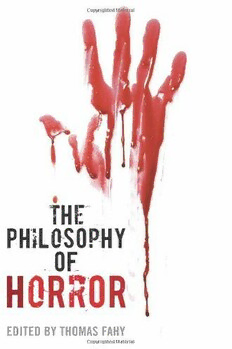
The Philosophy of Horror PDF
270 Pages·2010·4.495 MB·English
Most books are stored in the elastic cloud where traffic is expensive. For this reason, we have a limit on daily download.
Preview The Philosophy of Horror
Description:
From the Inside Flap Whether through film, television, or popular fiction, horror engages audiences like no other genre. From the classic novel to the latest slasher flick, horror has struck fear in the hearts of generations of readers and viewers across the centuries. The thrill and exhilaration generated by a terrifying story not only excite the senses but also raise important questions about safety, justice, suffering, and other human concerns. The Philosophy of Horror examines why horror fascinates fans by exploring the social, moral, and artistic statements of the genre. Editor Thomas Fahy has assembled a team of scholars to investigate topics as diverse as the genre itself. From classic films such as Psycho (1960) and The Shining (1980) to contemporary and highly controversial torture-horror films like Hostel (2005) and the Saw series, the contributing authors trace the development of horror as a form of art and entertainment. The Philosophy of Horror explores the underlying philosophical concepts of classic horror fiction, such as Mary Shelley's Frankenstein, as well as works that have been largely ignored in philosophical circles, including Truman Capote's In Cold Blood and Patrick Süskind's Perfume. Together the essays follow the evolution of the horror genre across the decades, investigating the theoretical underpinnings of each work in the context of its time. This diverse collection explores horror from a variety of perspectives and draws on a wide range of interpretive approaches, including feminist, postcolonial, Marxist, and psychoanalytic criticism. The result is a comprehensive study of fundamental questions about morality, identity, social constructions, and other topics raised in horror narratives. The Philosophy of Horror confirms what horror fans have known for decades -- horror is not only entertaining but also deeply insightful. Inviting readers to ponder this genre's various manifestations since the late 1700s, this collection of probing essays allows fans and philosophy buffs alike to view horror narratives with fresh eyes and consider their dark themes within the framework of philosophy. The Philosophy of Horror is a celebration of a strange, compelling, and disturbing tradition in art and entertainment. Horror not only excites and entertains audiences; it also leaves them searching for answers. About the Author Thomas Fahy, director of the American Studies Program at Long Island University, is author or editor of numerous publications, including Staging Modern American Life, Freak Shows and the Modern American Imagination, and two recent horror novels, Sleepless and The Unspoken. He lives in New York City.
See more
The list of books you might like
Most books are stored in the elastic cloud where traffic is expensive. For this reason, we have a limit on daily download.
